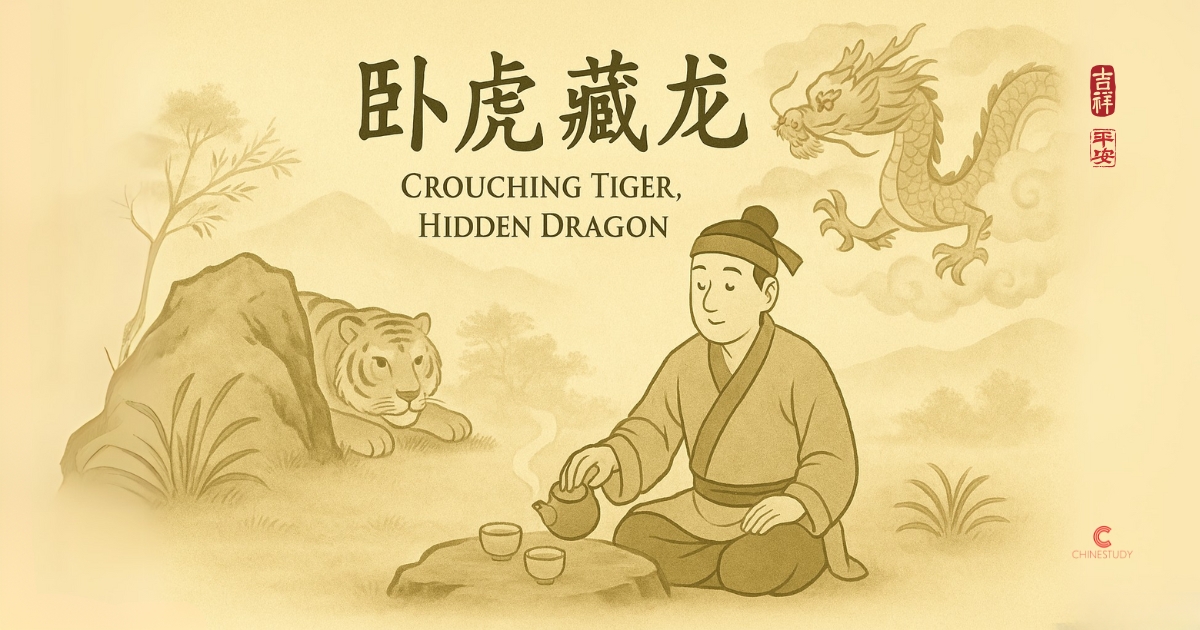🐯🐉 卧虎藏龙 wò hǔ cáng lóng – Crouching Tiger, Hidden Dragon

🔍 What It Means
卧虎藏龙 (wò hǔ cáng lóng) literally means “crouching tiger, hidden dragon.”
Word-for-word:
- 卧 (wò) – to crouch, to lie low
- 虎 (hǔ) – tiger
- 藏 (cáng) – to hide
- 龙 (lóng) – dragon
This idiom describes a place or situation where many talented or powerful people are hiding their true skills.
In English, it’s like saying:
- 🧠 “Hidden genius”
- 🎭 “Don’t judge a book by its cover”
- 🎯 “Quiet waters run deep”
🏺 Where It Comes From
This idiom comes from an old Chinese saying.
Long ago, people believed that tigers and dragons were symbols of great power. But sometimes, these mighty creatures would hide in the mountains or clouds — silent, invisible, but still powerful and dangerous.
That became a metaphor:
There may be powerful or gifted people around you — even if they look ordinary.
💬 How to Use It
Use 卧虎藏龙 when talking about a place or group full of hidden talents.
- ❌ It’s not about showing off — it’s about what’s not obvious.
- ✅ Use it to praise a school, company, team, or even a quiet person with surprising skill.
🎯 Real Examples
1. 这所学校看起来普通,其实是卧虎藏龙,有很多才华出众的学生。
- Zhè suǒ xuéxiào kàn qǐlái pǔtōng, qíshí shì wò hǔ cáng lóng, yǒu hěn duō cáihuá chūzhòng de xuésheng.
- 👉🏻 This school looks ordinary, but it’s full of hidden talent — truly crouching tiger, hidden dragon!
2. 别小看这个小村子,这里卧虎藏龙,很多人都有特别的本领。
- Bié xiǎokàn zhège xiǎo cūnzi, zhèlǐ wò hǔ cáng lóng, hěn duō rén dōu yǒu tèbié de běnlǐng.
- 👉🏻 Don’t underestimate this village — it’s full of amazing people with hidden skills!
⚠️ Common Mistakes (Watch Out!)
❌ Mistake: Using it to describe one famous or powerful person
✅ Correct: It describes a place or group full of unnoticed talent
❌ Mistake: Thinking it means “fantasy” or “magic” because of the movie "Crouching Tiger, Hidden Dragon"
✅ Correct: It describes real people or places quietly hiding their true abilities
💡 Memory Tip

Imagine walking into a peaceful courtyard.
A man is quietly pouring tea — nothing about him stands out.
But nearby, a tiger crouches behind a rock.
And above, a dragon drifts silently through the clouds.
Each one calm… yet full of power.
That’s 卧虎藏龙 — a place full of hidden strength and quiet talent.
🧩 Interactive Practice
Translate this sentence into English:
- 他家真是卧虎藏龙啊。
Answer:
His family is full of hidden talent.
🌟 Final Thoughts
卧虎藏龙 reminds us to look deeper — many people or places hide strength beneath the surface.
✨ Who around you might be a hidden dragon or crouching tiger?
👉 Stay tuned for the next idiom in this series!
Thank you for subscribing!
Have a great day!